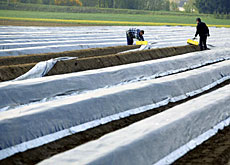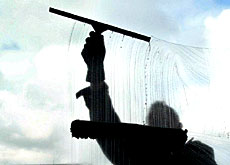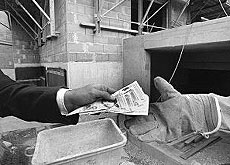Government moves to curb illegal working

The number of illegal workers continues to increase in Switzerland, and they now account for almost ten per cent of Switzerland’s Gross Domestic Product (GDP).
The government wants to crack down on the black economy with a raft of tough measures and penalties, which were debated in parliament on Thursday.
The House of Representatives accepted the government’s draft legislation by an overwhelming majority. The project will now be submitted to the Senate.
The State Secretariat for Economic Affairs (Seco) estimates that illegal workers earn SFr37 billion ($29.5 billion) each year. The government misses out on millions through lost taxes and welfare contributions.
It is estimated that the number of illegal workers in Switzerland grew by 75 per cent between 1999 and 2002. They predominantly find employment in the building, catering and agricultural sectors.
Both politicians and the business community agree that illegal working is a serious problem and that more needs to be done. But the government’s proposal has taken more than four years to reach parliament.
After lengthy discussions and political squabbling between the Right and Left as to how far the measures should go, a key parliamentary committee finally found a compromise.
Politicians from the Left were especially concerned that tougher legislation should not become a vehicle for targeting illegal immigrants.
“Most illegal workers are Swiss,” parliamentarian and trade union leader Hugo Fasel told swissinfo. “But the discussion very often centres on foreign workers.”
Illegal workers
The Left registered strong objections to the government’s plan to create a network through which federal and cantonal authorities could exchange information about illegal workers.
It said employees without a work permit should be allowed to pay social insurance without being reported to the authorities.
The current proposal is more flexible and does not oblige officials to check whether or not a person making payments is an illegal worker.
But the final draft also goes some way towards satisfying demands by the Right to reduce the amount of red tape.
It makes it easier for casual workers earning low wages, such as gardeners and cleaners, to register with a social insurance scheme.
Scare tactics
However, the main thrust of the government’s proposal is to make illegal employment in Switzerland as unattractive as possible.
It includes fines of up to SFr1 million ($800,000) for employers who hire illegal workers. Offenders will also be banned from applying for public contracts.
The cabinet also wants cantons and authorities to step up cooperation in the fight against abuses in the labour market.
Some cantons have already introduced stricter controls. In canton Zurich, random inspections are carried out on building sites – a third of them were found to have breached regulations in 2003.
But experts are divided as to whether clamping down on illegal working will really solve the problem.
“We are just scratching the surface and this doesn’t go deep enough into the actual causes [of illegal working],” said St Gallen economics professor Franz Jaeger.
swissinfo, Andreas Keiser
Up to one million people work illegally in Switzerland, according to a study.
An estimated SFr37 billion ($29.5 billion) – or 10% of GDP – is earned by illegal workers.
Switzerland is among the top ten of countries with fastest increase of illegal employment.
The government wants to increase fines and extend prison terms to combat illegal work practices.
Farmers who illegally hire labour stand to lose government subsidies; builders can be excluded from public tenders.
Illegal workers are popular in the service sector, the building trade and agriculture.

In compliance with the JTI standards
More: SWI swissinfo.ch certified by the Journalism Trust Initiative



You can find an overview of ongoing debates with our journalists here. Please join us!
If you want to start a conversation about a topic raised in this article or want to report factual errors, email us at english@swissinfo.ch.